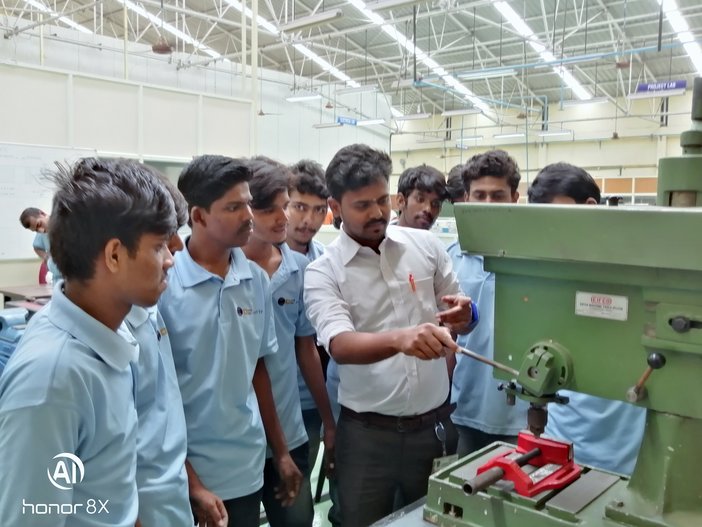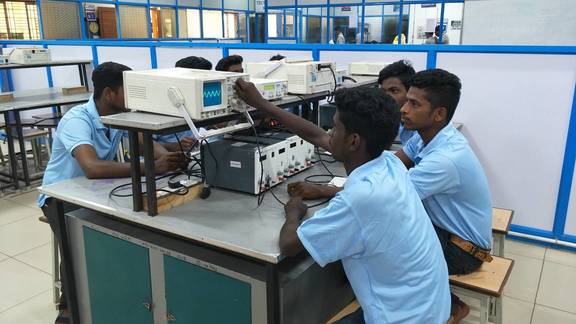
Just like learning, skill development is an ongoing process. A person’s employability largely depends on his/her skills. Moreover, technology has disrupted various job roles that require skilling, reskilling and up skilling. How is Nettur Technical Training Foundation (NTTF), a pioneer increasing skilled youth, making skills aspirational? What are the initiatives that are taken and the strategies that are being followed by this premier institution to make the youth industry ready? With 60+ years of rich experience in delivering industry relevant training, NTTF is on a journey to provide skilled manpower to the industry by bridging the industry-academia gap. To capture the Skill Story of NTTF, Team NSN interacted with Mr. Anil Kumar, Sr. General Manager – Skills Development, NTTF. Here’s more…
Q: How is NTTF making youth employment-ready with focus on demand-driven courses from various industries?
A: NTTF is a six-decade old institution which has always concentrated on imparting technical training to the youth with standards accepted across countries. Our nation is at the cusp of demographic transition with 65% of the population in the working age.
For more than a decade, NTTF has been into delivering industry-focused skill training programs to the youth in partnership with NSDC and Sector Skill Councils and also as a part of its CSR activity.
To meet the skilled manpower requirement of the industry, NTTF has collaborated with major industries to provide Technical training with relevant skills in various technical trades across sectors, make them readily employable and provide suitable job placements on completion of the course. Thus, NTTF plays a major role in making youth employment ready.
Q: Skilling, Upskilling and Reskilling – what are some of the programs from NTTF in these three areas and how do you envision the future of skill development in Post-Covid-19 world?
A: At NTTF, our vision is to make our students industry-ready by training, skilling and up-skilling as per the industry requirements. To achieve this goal, we are associated with Industries, have partnered with various Govt. initiatives and partnered with NSDC, National Scheduled Castes Finance and Development Corporation (NSFDC), Ministry of Rural Development, State Skill Development Councils of Tamil Nadu, Andhra Pradesh, Rajasthan, Kerala, Odisha and Jharkhand. We have also partnered with major Sector Skill Councils.
For upskilling, we majorly focus on Recognition of Prior Learning (RPL) and this is being carried out with respect to the NSDC’s guidelines. There are people whose skills are passed on to them from generation to generation, informally. Under this scheme, the persons with the right skills are being recognized, Up-skilled and certified which further helps them in their future. We are contributing to a larger number of programs at both state and central level to enhance employability as specified in the National Skill Development Policy.
When it comes to reskilling, with respect to the IT industry, we provide training on new-age technologies to make our students future ready. We make use of blended learning platforms with online as well as classroom modules through practical and hands-on training. To name a few, we have course modules on AI, ML, IoT, Big Data Analytics, Robotics, Cyber Security, Cloud computing and so on.
The skill development scenario, post COVID-19, is definitely going to change as the pandemic has created more awareness as to how we should align ourselves in future. It has accelerated the need to ensure that people around the globe have the necessary technology skills (transition to digital/virtual work) and access to do their jobs.
At NTTF, we are encouraging our managers and team leaders to enhance their digital skills along with their auxiliary skills such as teamwork, creative problem solving, and openness to new ideas and so on. Our focus has always been more on practical and hands-on training.
 Q: Please tell us about your partnerships with organizations like SDI in different regions and other national level projects implemented by NTTF. What are some of the highlights and achievements?
Q: Please tell us about your partnerships with organizations like SDI in different regions and other national level projects implemented by NTTF. What are some of the highlights and achievements?
A: Right now, we are associated with 3 major SDI’s in the Hydro Carbon Sector (Oil & Gas), namely- SDI – IOCL, Bhubaneswar in Odisha, SDI- BPCL, Kochi in Kerala and SDI- GAIL, Rae Bareli in Uttar Pradesh
Under these partnerships, we offer six-month certification program for ITI students which caters to the needs of the Oil and Gas industries. Since 2017, we’ve trained and placed 600-700 students in this sector.
Q: How is the response to the “Learn and Earn” programs that support youth with work-integrated learning, is it limited to the manufacturing sector? How do you select the students for this program?
A: “Learn and Earn” is an initiative that bridges the gap between the industry and academia by developing a steady pool of trained manpower. The program is well-received by the individuals as well as the associated industrial partners and the response towards it is overwhelming.
We have partnered with industries across India to bring a change, especially to those youth hailing from economically backward and underprivileged from rural areas and those residing in industrial and under-developed regions. Our focus is mainly on these areas because we are inclined to cater to the educational needs of the dropouts and underprivileged and also show them avenues to sustainable livelihoods.
 With our “Learn and Earn” program, we ensure the continuity of education while the students are earning. Students are supported with a reasonable monthly stipend to manage their living expenses. We also involve the parents in the decision-making processes by informing and convincing them.
With our “Learn and Earn” program, we ensure the continuity of education while the students are earning. Students are supported with a reasonable monthly stipend to manage their living expenses. We also involve the parents in the decision-making processes by informing and convincing them.
Parents are also not worried as their children are not going to industries as workers, instead, they are going as students to gain work experience. Along with the practical experience the students also get a diploma or a certificate. One percent of the student’s stipend goes to his/her parents, so that the parents are convinced that their children are studying and earning. Under this program, every week, the students learn in the industry for five days and come to the academy for one day for theory sessions.
To produce skilled and employable manpower in the global market and to take part in the development of state and country, we have collaborated with several industries in imparting quality, value-added education and training in technical and management fields. Considering our scope of training and expertise, we are presently support manufacturing sectors. However, we have plans to extend these to other sectors as well and working towards achieving it.
Q: Currently how many Sector Skill Councils (SSCs) are you associated with? What are the top 3 industry sectors that are generating the greatest number of jobs and how do you intend to skill the youth?
A: Considering the infrastructure and the history of our organization, NTTF is basically into Mechanical Engineering, Computer Science and Electronics. We are associated with six major Sector Skill Councils- Capital Goods Skill Council (CGSC), Electronics Sector Skill Council of India (ESSCI), IT-ITeS Sector Skills Council NASSCOM (IT-ITeS), Telecom Sector Skill Council (TSSC), Automotive Skill Development Council (ASDC), and Skill Council for Mining Sector (SCMS). We are very optimistic to foray into other sectors and working very hard towards achieving it.
As per our statistical data, major sectors that are creating more job opportunities are Capital Goods (CGSC), Electronics (ESSC) and Mining (SCMS)
Q: Are the skill-based courses being offered through online platforms? What are some of the challenges in offering these courses and how are you coping with them?
A: The pandemic has created new challenges for us. Technology has a major impact on the modern working environment. Although online learning has numerous technical difficulties, we are trying to overcome with our innovative initiatives.
For all of our regular programs, we provide students with required gadgets and they are able to access the courses. Even for practical sessions we are trying to incorporate Artificial Intelligence, AR/VR and other technologies and make it available.
For our certification programs major chunk of students are from the underprivileged background, It is practically not possible for them to be fully-equipped with the modern devices. To address this issue, we are working on building a common learning platform which will be beneficial for everyone so that the training outcomes are as expected and we meet our objectives.
When we talk about online education the drop-out rates are often higher. Let’s say a student is not able to access the online courses, there is a chance he/she might drop out from the course. It’s a challenge for us to keep that particular aspect in mind and work towards it so that the attrition rate is at minimum. In Kerala we are already working towards facilitating the rural students with necessary facilities where they can come to a nearby library and access the course.
To get equipped with these kind of unprecedented situations, we have plans to distribute tabs to students for the whole term, so that we can make sure that they are connected and are able to access our online courses. We are still working on this idea and our team is working hard to materialize it in the near future.
Also read: How NTTF ignites the spirit of entrepreneurship through Skill-based Education and Training https://nationalskillsnetwork.in/nttf-ignites-the-spirit-of-entrepreneurship-through-skill-based-education/













Comments 2